September 30, 2024
Take action this Breast Cancer Awareness Month
 For the past four decades, the United States has recognized October as National Breast Cancer Awareness Month. It is a time annually devoted to educating everyone about breast cancer — including metastatic breast cancer (MBC) — and the importance of early detection and access to timely, high-quality care.
For the past four decades, the United States has recognized October as National Breast Cancer Awareness Month. It is a time annually devoted to educating everyone about breast cancer — including metastatic breast cancer (MBC) — and the importance of early detection and access to timely, high-quality care.
No matter who you are or where you live, breast cancer is likely to touch your life.
- Breast cancer is the most common cancer globally with around 2.3 million new cases every year. It represents one in eight cancer cases in both sexes and a quarter of all cancers in women.
- One in eight women will be diagnosed with breast cancer in her lifetime, according to the World Health Organization. That’s one diagnosis every two minutes in the U.S.
- The two most common risk factors of breast cancer are being born female and getting older.
- In 2022, it is estimated that nearly 44,000 people in the U.S. will die from breast cancer.
- Black women in the U.S. are about 40% more likely to die from breast cancer than white women due to inequities in treatment.
These are the reasons why it is so important to understand the warning signs of breast cancer, your risk of breast cancer and what is normal for you so you can take action if there are any changes in your breasts or underarm areas.
The UW Combined Fund Drive encourages you to take action on breast cancer this month — both for yourself and for others.
Take care of yourself
Know your risk – Understand the genetic and physical risk factors of breast cancer. Talk to a doctor about your family history and see how that history impacts your risk of breast cancer. You and your doctor can create a personalized plan to monitor for signs of the disease.
Get screened – For those at average risk, have a mammogram every year starting at age 40. If you have any signs of breast cancer, finding it early and treating it early may save your life.
Know your normal – It’s important to know what’s normal for you so you can talk with your health care provider if something doesn’t look or feel right.
Make healthy lifestyle choices – Living a healthy lifestyle is within your control and may lower your risk of breast cancer. Maintain a healthy weight, limit alcohol intake and exercise regularly. It all matters when it comes to your overall health and risk of disease.
Get more information
UW Medicine – Providing screenings and personalized treatment plans, plus a wealth of information on breast health, screening, identifying risk factors and warning signs, treatment options and more.
Right as Rain by UW Medicine – A wealth of informative articles featuring UW experts and the latest research on different aspects of breast cancer.
Fred Hutch Cancer Center – Providing screenings and treatment at a world-class research institution, plus information about breast cancer and treatment
Komen Breast Care Helpline – A free resource staffed by specialists and oncology social workers who provide emotional support and guidance to resources including financial assistance, access to screening and diagnostic services.
National Breast Cancer Foundation – Supporting breast cancer research and education, this site has wealth of information on early detection, diagnosis, stages and types of breast cancer, treatment, myths and education guides.
 Take care of others
Take care of others
There are many ways you can join the fight against breast cancer. Please consider making a one-time gift or setting up a monthly payroll deduction through the UWCFD to support one of our member organizations providing care and supporting research to develop more effective prevention and treatments of breast cancer.
National Breast Cancer Foundation – Spreading knowledge and fostering hope in the fight against breast cancer by funding free mammograms for women who could otherwise not afford them and supporting research programs in leading facilities across the country (Charity Code: 1479164).
Breast Cancer Research Foundation – Funding innovative breast cancer research worldwide to achieve major advances toward achieving prevention and a cure in our lifetime (Charity Code: 0315899).
Fred Hutch Cancer Center – Conducting research of the highest standards to improve prevention, detection and treatment of cancer and related diseases to reduce pain and suffering caused by these diseases (Charity Code: 0315947).
Susan G. Komen Foundation – Fighting breast cancer on multiple fronts: research, community health, global outreach and public policy initiatives in order to make the biggest impact against this disease (Charity Code: 0315898).
Breast Cancer Prevention Partners – The organization, formerly called the Breast Cancer Fund, identifies — and advocates for the elimination of—environmental and preventable causes of breast cancer (Charity Code: 0496942).
Sisters Network Inc. – A national African American breast cancer survivorship organization empowering women through support, education, financial resources and early detection (Charity Code: 1478545).
National Breast Cancer Coalition – Dedicated to ending breast cancer through the power of grassroots action and advocacy (Charity Code: 0315897).
Living Beyond Breast Cancer – Empowering all women affected by breast cancer to live as long as possible with the best quality of life (Charity Code: 1480787).
Ovarian and Breast Cancer Alliance – Promoting lifesaving early detection of ovarian and breast cancer through education and awareness (Charity Code: 0524576).
United Breast Cancer Foundation – Making a positive difference in the lives of those affected by breast cancer through programs such as free breast screening and college scholarships (Charity Code: 1480707).